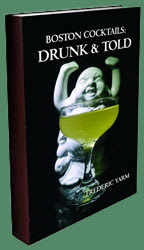Recently [in early 2017] on Reddit, an user expressed concern that he was losing motivation and needed inspiration. He felt that he had reached the pinnacle of bartending in his town, and he wanted to excel to the level of those he looked up to in the big city. Most of us have had that feeling that we could do better or become better. Sometimes it comes from being in a more isolated drink community but other times it can just stem from being in a small bar program with no one around to mentor you. I came up with a list of a few pointers on how to improve the situation on Reddit, and I expounded on those points here.

One of the best feelings is to bring up the people around you and under you by sharing your knowledge and enthusiasm. This can raise your bar community or bar program, and the aphorism “a rising tide lifts all boats” applies. Indeed, it may soon be possible to learn from those that you taught especially if they are motivated to learn on their own or if they ask you questions that make you think and research.
2. Travel. Apply to be a Tales of the Cocktail apprentice or to attend Camp Runamok or the Bar Institute [now Portland Cocktail Week once again]. You will meet and learn from people who know more.
When I first ventured out to Tales of the Cocktail, I certainly was not under the impression that I had hit my peak or had learned all that I could in my city. I was not even a professional bartender yet but a writer and home enthusiast. However, it brought me into contact with writers better than myself and with bartenders who could teach me things that were not as available to me in my city and my position. I have yet to be a Tales of the Cocktail apprentice, but Camp Runamok and Portland Cocktail Week (the predecessor of the Bar Institute) were great experiences in meeting a wide variety of bar professionals with many viewpoints, specialties, and techniques to share. And the learning kept up after those events through the connections I have made at those events.

There is time to read if you look for it. Before you leave for work, during meals, when you get to work early and have time to kill, and on your days off are all times when you can read. I try to mix things up with books on history, spirits, beer, hospitality, recipes, technique, and theory. Sometimes the book titles come recommended by peers and other times it is Amazon suggesting similar titles or it is an article that mentions book titles. And other times, it comes from me web searching for guidance in a specific field. Regardless of where the respective authors are located, their teachings will be close at hand and wherever you go (assuming you remember to put the book in your bag).
4. Write. Take yourself to the next level by becoming a scholar. Research and get your voice and name out there.
Both writing and giving talks have been some of the best ways to push myself into learning more about a topic. In many ways the process also harkens back to the first point of teaching and improving the level of your environment. But if part of the envy of those big name city bartenders is notoriety, then getting your name on a byline or book spine may help.

This is something that I wish I let myself follow more. At one point, I considered doing a stage a month, but I never pushed myself to follow through. However, doing guest shifts such as at a Tiki or blender drink night let me learn about how different bars are set up and allowed me to focus on a drink style that was not my normal specialty. The guest shifts and staging also help in learning about other philosophies and techniques. And on a short staffed night at a previous job, my owners allowed me to bring in a guest bartender to help me out for the night. The bartender I selected was a sales rep who left bartending and missed it. While having an extra pair of hands back there was surely an asset, the true value was that he had wisdom from some of the finest spots in town where he had been behind the stick and he was able to problem solve issues I was facing and share his knowledge about the trade. I think about this every shift when I insert a fish tub lid to keep my cubed ice separated from my crushed ice in the well.
6. Move. I put this last after you've exhausted the others.
I do not have the luxury to just get up and move to a new state as freely as a young, single bartender might, but the option is there if need be. Move can be as simple as changing the bar or restaurant you work in or changing the city or state as well. There are so many ways of improving yourself within your position and location, but the world is a big one and so full of opportunities. And many of those opportunities will expose you to new challenges that can lead to self-improvement and learning. It may also lead you to understand that bartending is a combination of technique and hospitality, and some of the best recipe- and technique-driven establishments that get the press do it at the expense of some aspect of hospitality. Sometimes life is better when the simple things make your guests happy, and often there is a happy medium between the two.
 The 2017 collection of 855 drink recipes, bartender tributes, and essays on hospitality from CocktailVirgin's Frederic Yarm. Available at
The 2017 collection of 855 drink recipes, bartender tributes, and essays on hospitality from CocktailVirgin's Frederic Yarm. Available at  The 2012 collection of 505 drink recipes, techniques, and Boston bar recommendations from Frederic Yarm. Available at
The 2012 collection of 505 drink recipes, techniques, and Boston bar recommendations from Frederic Yarm. Available at 




No comments:
Post a Comment